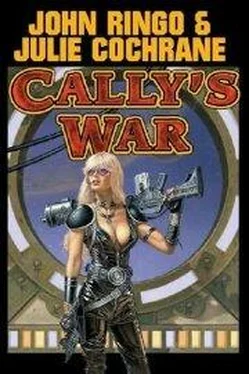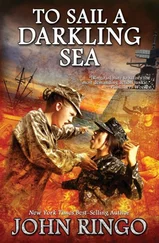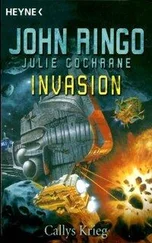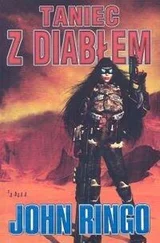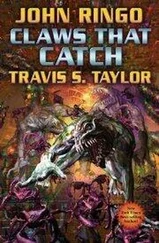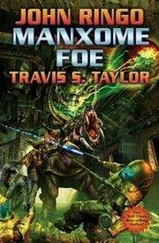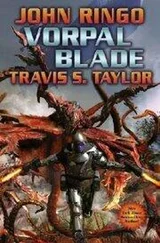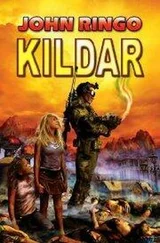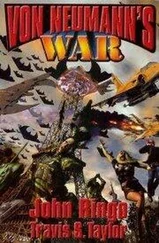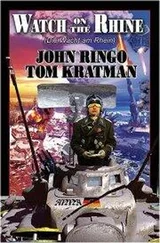“Cincy.”
“Oh. Well, you can, like, ride the whole way then. That’s cool.” He looked uncomfortable for a minute. “I’ll just have to pretend you got out in Knoxville, when the convoy zone ends.”
“Will I get you in trouble?”
He thought a minute and shook his head. “Nah, not really. The boss isn’t too bad a guy. If he finds out I’ll just tell him it was part of your fee for riding guard from here to Knoxville.”
“So what do you haul?” she asked politely, glancing over her shoulder into the back of the van where several packed aquariums bubbled away, air exchanges sticking up several inches above the sealed lids.
“Blue crab. Like, live, you know? Buncha rich dudes in Chicago like their fresh seafood.” He shrugged.
“So why you and why not one of them?” She waved at the lines of semis ahead and behind them.
“Oh, like, it’s a niche market. They’re carrying frozen stuff, and, well, some of ’em have iced down live oysters and clams and stuff. Crabs are just incredibly fussy about live travel. But a little of the right stuff in the water so they aren’t too crabby,” he grinned, “and you can pack a lot of the little buggers into the tanks.”
“So, what, they’re too drugged up to rip each other to bits? What’s that do to them as food?”
“Basically,” he agreed cheerfully. “Like, put ’em in a clean, salt-water tank and in like six hours or so they’re clean. And crab valium doesn’t really affect humans, anyway, you know?”
She politely ignored that the inner dimensions of the back of the van seemed to her practiced eye to be just a bit smaller than the outside would normally indicate.
Business out of the way, he seemed more inclined to listen to his music than chat. That suited Cally fine. It must have been ten years since she’d had the time or need to take the overland route out of Charleston and she let her eyes glaze over watching the miles and miles of pine forest, punctuated by the occasional burn zone and abat-meadow.
It was only as they approached Columbia a couple of hours later that the now mixed pine and hardwood forests gave way to cleared fields of cows and crops, each field bordered by widely spaced sensor poles.
“I guess the bounties cover the costs of the sensors and the power to run them,” she said.
“Those bounty farmers are some strange birds. Get at least half their money off stalking bounties, spend half of that fighting the abat and grat. Real loner kinda dudes. Then there was one of ’em about fifteen years ago went totally off his nut and got caught breeding Posties. It was before my time, but he’d had a Postie God King next to his land. Seems he’d made a deal with it to deliver heads of Postie normals just up from nestlings in exchange for half the take. It was, like, really nasty what they did to him when they caught him.”
“How’d they catch him?” she asked politely, since Marilyn wouldn’t remember the story.
“He was always delivering twice the bounty of the other guys around him. I guess somebody just got suspicious. Next time the Postie God King made delivery, they had surveillance on him and everything.” He stuck a fresh piece of gum in his mouth. “What was real weird was when they traced the Postie back to where it had been living. Man, it was like a freakin’ magpie’s nest. Tinfoil, polished pennies, chromed bike bars and car parts and stuff, even some gold. The Postie must have been bughouse nuts, too. I mean, what are the odds.” He shrugged and they drove on in silence until the convoy began to slow as the front vehicles reached the gate into Columbia Trading Station.
Entry through the gates was much faster than exit from Charleston had been. The Columbia guards obviously wanted to keep the gates open as short a time as possible, admitting the entire convoy and closing the big steel slab behind them before beginning the paperwork.
As he waited his turn to sign in he waved across the large parking lot to a squat building with gas pumps in front of it. One of the tankers in the line had pulled around to the side of the building and was unhooking hoses.
“I’ve gotta top off my gas after I get through here. It’s just the way they do this convoy thing. Won’t let you leave unless you’re full. If you want to go stretch your legs or buy a drink or, like, other stuff, this is the last stop until Spartanburg Station in three hours.”
As a tourist, goggling was normal, so she took the opportunity to get a good long look at everything while she went up to the station building to wait in line for the restroom. The place hadn’t changed much in ten years. The asphalt of the big parking lot had been resurfaced at some point, but not too recently. They hadn’t expanded the walls any — it would have just been more perimeter to man in an emergency. Oh, the store was stocked a bit better, and there were a few more children trailing around with the occasional farm wife doing some shopping, but mostly it was the same old general store, feed and seed, and bounty processing center. She bought a glass of apple cider and some gingersnaps and went back out into the parking lot. The single mechanic’s bay was taken up with work on a tractor today. Fortunately no one in the convoy seemed to need it. Over by the incinerator the bounty agent was paying off on a few Postie heads. She wrinkled her nose as the shifting wind wafted over the unforgettable stench of ripe, dead Posleen mixed with motor oil and exhaust fumes. She took her snack back towards the van, farther away from the grisly trophies, walking past one of the refrigerator trucks that was offloading a few crates of fish and perishables for the station store and loading some crates of spring greens and assorted poultry and dairy products. A semi was unloading a couple of crates of miscellaneous merchandise but, not being refrigerated, had nothing to take on to fill the space left.
She looked around at the various trucks and buses, and the occasional car, and sighed. It would probably be at least fifteen minutes before they got moving again, and there just wasn’t a lot more to see. She pulled out her PDA and spent the rest of the break clicking through the daily news.
* * *
The road to Spartanburg seemed quiet enough, the scenery by the side of the interstate passing from fields and cows near Columbia to dense stands of pine and poplar starting a few yards back from the Roundup zone. The edges of the highway had earned the popular appellation from the tanker truck that came through at the back of the convoy every few months with a sprayer attachment to mist the roadside with the inexpensive herbicide. Federal authorities had decided early on that it was easier, cheaper and safer than lawnmower crews for maintaining a small but adequate free-fire zone back from the road. In the spring, runners from the underbrush reached back quickly to reclaim the tempting open soil and ready sunlight — it looked like another run with the sprayer truck was a bit overdue.
The tender vegetation at the border was especially attractive to the herds of whitetail, who were no doubt accustomed to safe feeding times morning and evening when neither the convoys nor other traffic disturbed their peace. Predation by the occasional feral Posleen kept the herd barely below starvation levels. Healthy deer could usually smell, hear, and outrun a lone Posleen normal. Unfortunately for the deer, this fact failed to stop feral normals from trying. This became clear to the convoy when a yearling buck broke cover right in front of a church van from Nashville, causing it to slam on its brakes and take a bump from the semi behind it that could almost, but not quite, stop in time.
The first indication Cally had that something was wrong was the crunch of metal behind them and the chattering of a machine gun, it sounded like one of the MG-90s on top of the semis. She grabbed the .45 from the glove box while Reefer swore and swerved as the bus in front of them hit the brakes and stopped in the middle of its lane, the van coming to a more gradual stop alongside the bus’s driver. All along the length of the convoy, the approximately thirty vehicles that comprised it were pulling to a stop, the drivers and gunners first looking for Posleen, and then, seeing none, checking their detectors and getting on the radios onto channel nineteen for official convoy information.
Читать дальше
